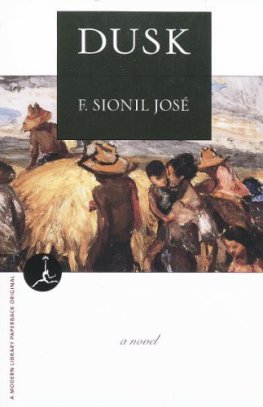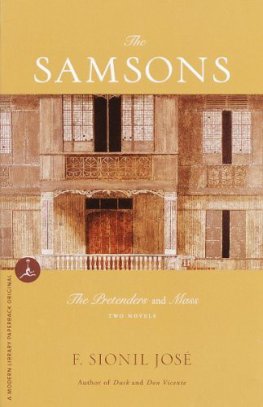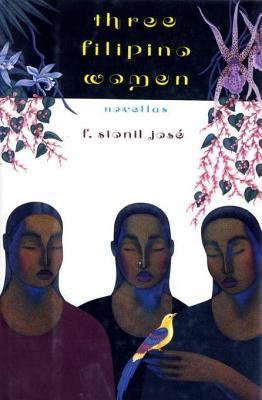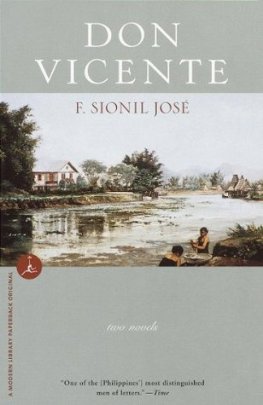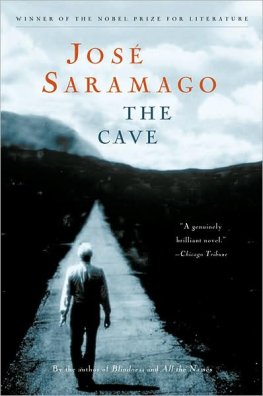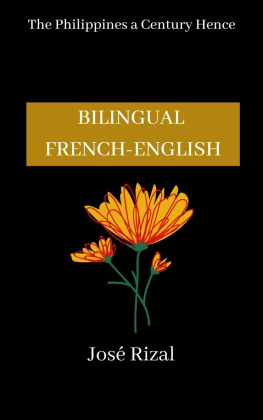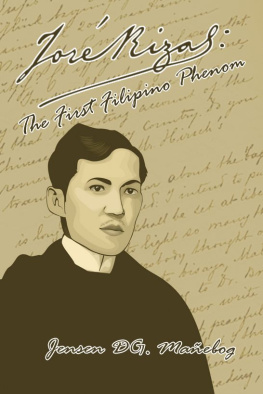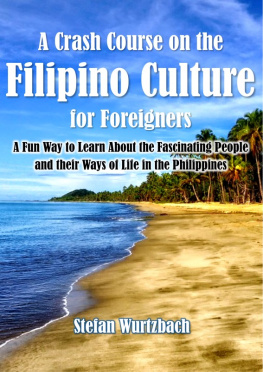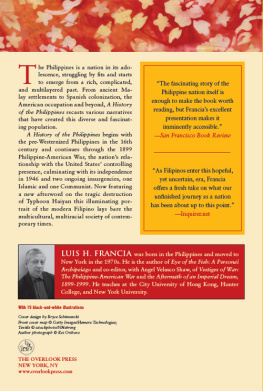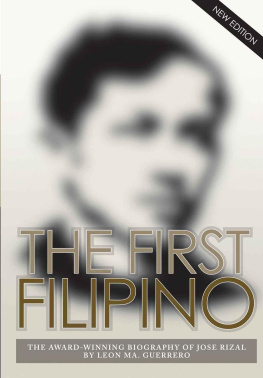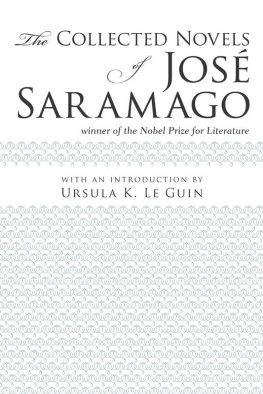For Philip, Frederick,
Evelina, and Stephen Cichy
NOTES ON THE WRITING OF DUSK (PO-ON)
When people ask me which of my novels I like best, I always reply, you are asking me which of my seven children I love most.
My Japanese translator, Matsuyo Yamamoto, thinks Tree is the most evocative. The poet and critic Ricaredo Demetillo thinks My Brother, My Executioner is the most dramatic and Tree the dullest. It is really difficult for me to say which is what, but this I can say: Mass is the book I enjoyed writing most, because I wrote it straight from beginning to end in one creative spurt. Besides, I wrote it in Paris.
My daughter Jette, who is my editor, thinks Dusk (original title, Po-on) is the best. Po-on, which means the beginning or tree trunk in my native Ilokano, is the first in terms of chronology.
Of the five Rosales novels, Dusk took the longest to write more than three decades. I had great difficulty, for it meant research into our past, the period from the early 1870s to 1898 and the Battle of Tirad Pass, the same period during which the Spanish regime was vanquished and the Americans took over. Dusk is simply the story of a family, or rather of a peace-loving man who led his clan in its flight from the narrow coastal plain of the Ilokos in Northern Luzon to the Central Plains. It is also a story of Spanish tyranny, and the Filipino response to it and to the American intrusion into our islands after the Spaniards left. The man who leads this hegira is the grandfather of Antonio Samson in The Pretenders, published in 1962, the first of the five Rosales novels. Four others followed: Tree; My Brother, My Executioner; Mass; and Po-on (Dusk).
All five novels may be read independently of one another, but all are linked, not so much by recurring characters as by their origins in a small Central Luzon town called Rosales. The name is incidental; Rosales can very well be any town in the Philippines. And running through all five novels are the basic themes that have always interested me as a writer: mans continuing search often futile, often hopeless for social justice and a moral order.
It is in Dusk where I define the patriot and hero. I do this at a time when heroes in the Philippines are movie stars and socialites turned politicians, soldiers who have betrayed the Constitution, and even returning widows with three thousand pairs of shoes.
The two major characters in Dusk are my fictional rendition of Apolinario Mabini, who in real life was the ideologue of the revolution against Spain, and Eustaquio Samson, the young acolyte who flees from the Ilokos with his whole clan.
Both heroes come from the lower classes. Mabini was lucky enough to escape his rural origins and come to Manila to study law. He was very bright and morally upright. Aguinaldo, the president of the First Republic, picked him to be his first foreign minister. He was, however, ousted from his position by the wealthy ilustrados who surrounded Aguinaldo and betrayed the revolution. According to Ambeth Ocampo, a young, fastidious historian, they concocted a plan to milk the fledgling republic, but Mabinis ethical and ideological principles foiled them. They spread the gossip that Mabini was a cripple because he was syphilitic, an untruth that I had swallowed and presented as fact in this novel. In 1988, his bones were exhumed and it was discovered that he had had polio. The succeeding editions of Po-on bear this correction and my deepest apology.
How do we fight the traitors, the charlatans who use the nationalist guise and pontificate to us in the media?
I learned a lot about Mabini and the revolution from scholars. In 1958 I met historian Cesar Adib Majul shortly after his return from the United States, where he did his Ph.D. dissertation on Apolinario Mabini. When I told him that evening that I am from Rosales, he said that Mabini had stayed in my hometown for a few weeks for a rest cure before he fled to nearby Cuyapo, Nueva Ecija, where he was captured by the Americans.
I had already started writing the Rosales novels and had designed the sequence and the themes. I knew then that I had to use Mabini and his presence in my hometown as the core incident in Dusk.
Unfortunately, neither Professor Majul nor the other noted Philippine historian, Teodoro Agoncillo, knew the circumstances of Mabinis stay in Rosales. I went back to my hometown and tried to dig up records they were either nonexistent to begin with or had been destroyed or lost. In the town municipio and the Catholic church, I couldnt find a trace of Mabini. I therefore deduced that he must have stayed with the leading ilustrado family at the time, the Pines, because they had the most imposing house.
The story of the Samsons who fled from the Ilokos bears personal meaning for me because I was also writing about my forebears, who came from a town called Cabugaw in Ilokos Sur. They settled in a village in Pangasinan that they named Cabugawan after the town from where they came.
I grew up in this village, listened to the stories of the elders about their flight from the north, the revolution against Spain. My forebears were very nationalistic and deeply religious as well. Most of all, I grew up with the knowledge of their suffering in the new land, their exploitation by the landlords, and the eventual dispossession of their lands. I also knew of the hardiness of their spirit, the dreams they shared, the angers that made them endure.
At the turn of the century, there were still no roads in much of Northern Luzon; there were a few stretches that were cobbled, remains of which may still be seen. Transport was usually on horseback, or on bull carts over rutted trails. The Ilokano carts had solid wooden wheels and were drawn either by bulls (there were many cattle ranches in the grassy foothills of the Cordilleras) or carabaos. The carts were covered with buri palm roofing. I saw some of these carts traveling the dirt roads of eastern Pangasinan in the thirties. As in the earlier part of this century, they usually carried Ilokano farmers from the north to eastern Pangasinan to glean the harvested fields or to help in the harvest. Land shortage in the Ilokos was basically responsible for this annual hegira.
The Ilokanos brought with them raw cotton, handwoven cloth, smoking and chewing tobacco, jars of cane wine, sugar, furniture, and in some instances, jewelry. They were prey to tulisanes, and this was one reason they traveled in groups.
Sometimes they returned to the Central Plains to settle. They would then usually carry all their worldly goods, the uprooted posts of their houses in the Ilokos, their santos and wooden chests, the weaving looms, all their farm implements and work animals.
These caravans often went all the way to Cagayan Valley, on the Santa Fe Trail (now Dalton Pass). Many of the settlers were not just land hungry; they were also fleeing Spanish tyranny. They were the pioneers who cleared much of eastern Pangasinan, Nueva Ecija, and the Cagayan Valley. These settlers were called the mal vivir or the agraviados. It should be remembered that as late as 1899, part of the big town of San Carlos, Pangasinan, was still jungle.
The merchants who took to the road, however, were different from the farmers. Most of them were Pangasienses, and carried provisions and produce they sold or bartered for grain. These were sugar cakes, sometimes made out of the sap of the buri palm, sweet preserves from pomelo rind, alamang (shrimp paste), salted and dried fish, twine, plowshares, bolos. There was much blacksmithing in Pangasinan then.

